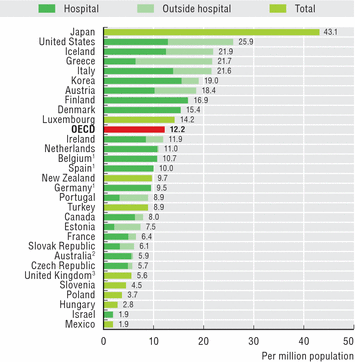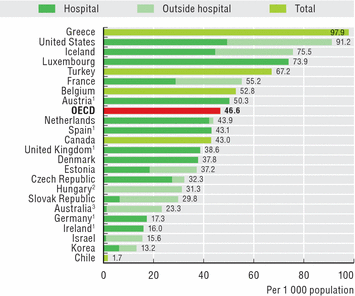Do you have any evidence that our healthcare infrastructure is poorly distributed relative to population? Or are you just making it up as you go?
Do you not realize that this is the case?
http://www.reuters.com/article/2011/07/27/us-rural-idUSTRE76Q0MJ20110727
Just look at job postings. Are they desperately trying to hire people for Huntington Beach or Fargo?
To answer the OP's question, I think we have a poor health care
delivery system for a number of reasons.
The payer is greatly separated from the person deciding what the patient receives. The physician is put in the position where we have to "do what's best for the patient, no matter the cost." Okay, fine. That means we go all-out and use the helicopter to fly some 98-year old to the level 1 trauma center so that they can be seen by the full trauma team and be rushed to the OR for a craniotomy and hematoma evacuation that resulted from a fall while on warfarin. He develops renal failure post-operatively and gets put on dialysis. Outcomes are expected to be "suboptimal." If the patient or family were at all involved in the cost of this heroic effort, then the palliative route would be prominently featured.
Patients and families expect everything. We go ahead and do it. Awesome article by Panda Bear -
http://www.pandabearmd.com/2006/11/24/dawn-of-the-dead/ (can't believe it's already been 6 years since he wrote it)
How about a 97-year old with a ruptured aortic aneurysm who spends months in the hospital?
http://www.nytimes.com/2006/12/25/health/25surgeon.html?_r=1&oref=slogin
There's a great deal of CYA attitude pervading medicine. Here's an example from an ED attending:
i would order 1000 ct's to potentially avoid a single lawsuit.
We use the latest and greatest technology. You don't need a da Vinci robot to do a hysterectomy, but patients think that bells and whistles mean better care, so they go to the hospital that advertises the new SURGERY ROBOT on their billboard. $2 million later...
We'll do liver transplants for $500,000 (the average cost) on an alcoholic who comes into the hospital still drunk. My wife saw it happen. Do everything for everyone, who cares what it costs? A little basiliximab is only $20,000 per dose. A round of induction therapy could use a dozen or two doses.
I bet Cuba doesn't place the latest Stryker prosthetic knees. Should they? Maybe not, but it certainly cuts costs.
We also have a long and expensive training process. I owe a lot more for my education than for my house, and I'll have spent 26 years in school/residency.
People want answers, and they want them now. I had a friend (~30-year old woman) go into her PCP with abdominal pain. $350. PCP says "Oh, we'll figure this out." Gets a same-day CT scan. $2000. Uh-oh, loop of thickened bowel, that's no good. Better get a colonoscopy and make sure it's not Crohn's! $4000. Oh good, it was nothing, the pain got better and there's no Crohn's. (these are all the real numbers, btw)
We don't structure our hospitals so that there's elimination of redundancy. Everyone gets the latest CT scanner and starts firing people through it one after the next. The hospitals are all competing with each other, and no one wants to be left behind in the arms race.





